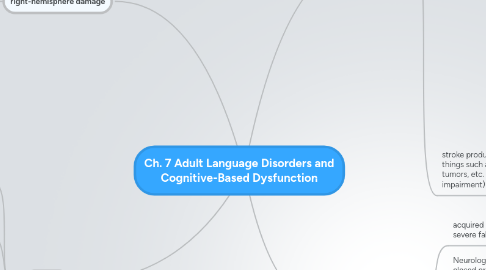
1. right-hemisphere damage
1.1. acquired cognitive disorder associated with damage to the right cerebral hemisphere
1.2. neurological damage to brain tissue due to loss of nutrients and oxygen to the brain
1.3. common causes: stroke, illness, disease
1.4. impacts:
1.4.1. lack of attention to the left side of the body
1.4.2. difficulty recognizing faces
1.4.3. lack of awareness of communicative and cognitive impairments
1.4.4. problems with higher-level abstract thinking
1.4.5. possible dysarthria and dysphasia
2. Dementia
2.1. loss of linguistic and cognitive ability due to a progressive brain disease
2.2. gradual onset of declines in cognitive, language, and daily living functions due to progressive central nervous system dysfunction
2.3. Causes: Neurological disease, multiple stokes
2.3.1. Huntington's disease
2.3.2. Parkinson's disease
2.3.3. Pick's disease
2.3.4. Creutzfeldt-Jakob disease
2.4. impacts:
2.4.1. memory impairment
2.4.2. impairment in cognitive skills
2.4.3. Presence of aphasia, apraxia, or agnosia
3. Aphasia
3.1. acquired language disorder typically from an injury to the left cerebral hemisphere
3.2. seven types:
3.2.1. Anomic
3.2.1.1. Angular gyrus
3.2.1.2. loss of words
3.2.2. Broca's
3.2.2.1. frontal lobe
3.2.2.2. effortful articulation
3.2.3. Conduction
3.2.3.1. Arcuate fasciculus
3.2.3.2. imitation problems, naming difficulty
3.2.4. Global
3.2.4.1. multiple lobes and diffuse lesions
3.2.4.2. delayed, or no speech initiation and output
3.2.5. Transcortical Motor
3.2.5.1. Prefrontal cortex
3.2.5.2. difficulty initiating speech, short utterances
3.2.6. Transcortical Sensory
3.2.6.1. Parieto-occipital region
3.2.6.2. meaningless speech and jargon, naming difficulties
3.2.7. Wernicke's
3.2.7.1. Temporal lobe
3.2.7.2. meaningless speech and jargon, naming difficulties
3.3. stroke produces most aphasias (many other things such as meningitis or encephalitis, tumors, etc. can cause neurological impairment)
4. Traumatic Brain Injury
4.1. acquired neurological injury from accidents, severe falls, or other acts of violence
4.2. Neurological damage to brain tissue due to closed or open-head injury
4.3. causes: motor vehicle accident, fall, recreational sports accidents, various acts of violence
4.4. impacts:
4.4.1. possible significant personality changes
4.4.2. language expression and comprehension problems
